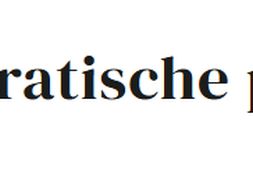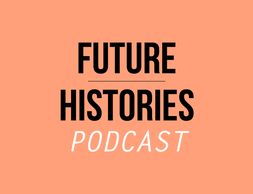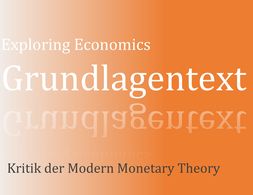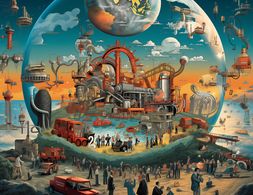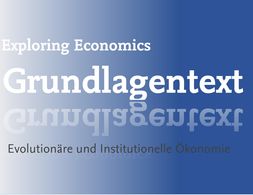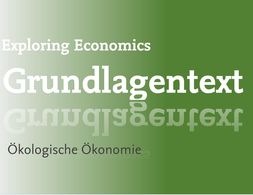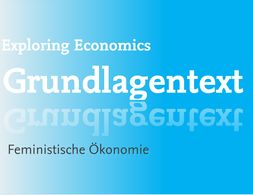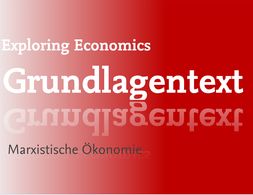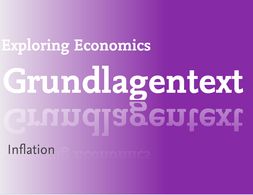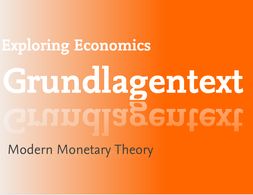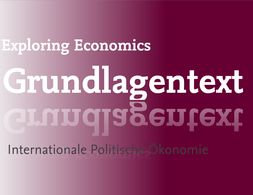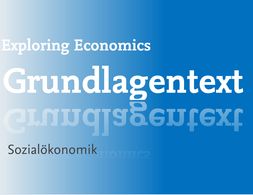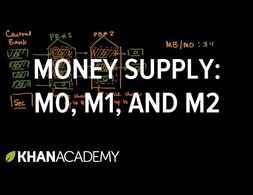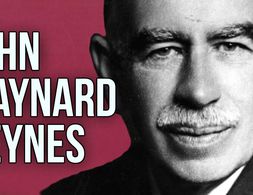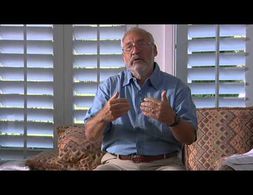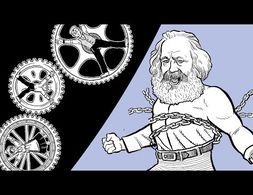Die alten kapitalistischen Zentren, aber auch die großen Schwellenländer befinden sich inmitten eines epochalen Umbruchs. Politikansätze, die das Problem der Klimaungerechtigkeit ignorieren, werden heftige Widerstände gegen die sozial-ökologische Transformation auslösen. Ein Beitrag von Klaus Dörre.
Der bisherige Einsatz von Fiskalpolitik, Geldpolitik und Handelspolitik hat zu vielschichtigen Problemen geführt. Um diese zu lösen, müssen wir unsere wirtschaftspolitischen Instrumente anders nutzten. Ein Beitrag von Dirk Ehnts.
Lineares Wirtschaften ist trotz alternativer Vorschläge fest etabliert. Dabei wäre eine effektive Umsetzung der Kreislaufwirtschaft nötig, um den Fußabdruck menschlichen Konsums deutlich zu verringern. Ein Beitrag von Patricia Urban.
Die moderne Akademia bietet keine guten Rahmenbedingungen für gesellschaftskritische Transformationsforschung. Eine Reform sollte an vier Punkten ansetzen. Ein Beitrag von Stephan Pühringer und Carina Altreiter.
Das Konzept der „Klimaschulden“ verstärkt das Argument, laut dem durch eine verengte Fokussierung auf die Schuldenbremse sinnvolle Investitionen blockiert werden können. Dabei sind Klimaschulden nur ein Beispiel für Kosten, die im BIP bislang nicht berücksichtigt werden. Ein Beitrag von Benjamin Held.
Die derzeit geltenden rechtlichen Begrenzungen von Staatsverschuldung basieren auf Mythen, die nicht ökonomisch fundiert sind. Sinnvoller wäre es, die Schuldenaufnahme so zu gestalten, dass sie die ökonomischen, sozialen und ökologischen Grenzen respektiert. Ein Beitrag von Carolina Ortega Guttack, Carl Mühlbach und Tung Doan.
Die Diskussion über die Zukunft der Demokratie hat sich eingetrübt – auch im traditionell demokratieoptimistisch eingestellten linksliberalen Lager. Ein Beitrag von Veith Selk.
Was es konkret bedeutet, autonom handlungsfähig zu sein, hängt von den jeweiligen produktiven Machtverhältnissen ab. Ein Beitrag von Karoline Kalke zur Notwendigkeit und Illusion der Selbstbegrenzung.
Angesichts der momentan Mehrfachkrisen gerät das lange Zeit dominierende neoliberale Gesellschaftsprogramm an seine Grenzen – und mit ihm seine konstitutiven Leitbilder. Daraus erwachsen demokratiezersetzenden und autoritäre Bewegungen. Ein Beitrag von Eva Groß, Andreas Hövermann und Amelie Nickel.
Unternehmen wird eine besondere Veränderungsbereitschaft zugeschrieben, und die Hoffnung ist, dass sie zu einem neuen Bild der Wirtschaft beitragen. Darin fehlen jedoch wesentliche andere Institutionen, die den Unternehmen Grenzen setzen. Ein Beitrag von Sabrina Schmidt und Carla Young.
Strategien wie Planetary Health und One Health haben ein großes Potenzial, zur Bewältigung der Gesundheitskrise beizutragen. Allerdings gilt es, dies auch zu nutzen – und hier besteht nach wie vor großer Handlungsbedarf. Ein Beitrag von Karen Pittel.
Lange wurde die Infrastrukturentwicklung mit Wirtschafts- und Wohlstandswachstum gleichgesetzt. Unter ökologischen Gesichtspunkten ist dieser Zusammenhang jedoch nicht mehr eindeutig. Ein Beitrag von Astrid Krisch.
Die post-Keynesianische Ökonomik beschreibt die grundlegenden Funktionsweisen des Kapitalismus mit besonderem Fokus auf Wachstum und Verteilung. Aber ist sie auch in der Lage, ökologische Krisen zu erfassen und geeignete Lösungsansätze zu entwickeln?
Das Webprojekt Demokratische Planung gibt eine Übersicht über unterschiedliche Modelle demokratischer Wirtschaftsplanung und beantwortet zentrale Fragen zum Thema.
This article outlines the fundamental challenges of democratically planned economies and categorises proposed models into six groups, each of which approaches planning and coordination at different levels of authority and between myriad economic units in a particular way, taking into account efficiency as well as democratic principles and environmental and social sustainability. Through a classification system based on decision-making authority and mediation mechanisms, the article provides a framework for understanding and comparing these models. By examining their different approaches, it offers insights into the complexities and potential paths of democratically planned economies in the 21st century.
Our public services are in dire need of investment. But in the middle of a debate over competing spending plans, isn’t it also time to ask what we want our public services to actually do for us? That’s the view of group of economists and campaigners who are pushing for something called ‘Universal Basic Services’ – a radical expansion of high-quality public services for all to areas like transport, childcare and social care.
Die »New International Economic Order« (NIEO) war der erste alternative Globalisierungsentwurf: ein Projekt zur Überwindung kolonialer Wirtschaftsstrukturen zwischen dem Globalen Süden und dem Globalen Norden. Die Beiträger*innen fragen angesichts globaler Armut, der Klimakatastrophe, zunehmender internationaler Konflikte und der Krise des Kapitalismus nach der heutigen Relevanz der NIEO – und zeigen die Dringlichkeit einer radikalen Transformation der Weltwirtschaft auf.
Bildungsmaterial von Attac für Schulen und außerschulische Bildungsarbeit zum Thema Kryptowährungen
Wenn wir die ökologische Krise verstehen wollen, müssen wir die Arbeitswelt verstehen, sagt Simon Schaupp und plädiert für eine kämpferische Stoffwechselpolitik.
Ungleichheit ist derzeit eine der größten ökonomischen Herausforderungen. Immer häufiger wird in diesem Zusammenhang auf die Rolle von Narrativen hingewiesen. Ein Essay von Henri Schneider, Henrika Meyer und Julia Schmid.
Müssen wir wirklich die Natur retten? Natürlich! Heute mehr als gestern – und morgen erst recht. Und dennoch transportiert die Frage ein Problem, welches Ramona Schmidt in diesem kurzen Beitrag diskutieren möchte. Denn die Frage trennt Menschen kategorial von der Natur.
Seit Jahrzehnten wird über ökologische Grenzen des Wachstums und nachhaltige Entwicklung diskutiert. Die Ökonomik ist jedoch auf dem »Materialauge« weitgehend blind und setzt einfach darauf, dass ressourcenschonendes Wachstum möglich ist, frei nach dem Motto: was sich denken lässt, lässt sich auch umsetzen. Ein Essay von Oliver Richters und Andreas Siemonei.
Ein neues Traktat von Papst Franziskus löst in marktliberalen Kreisen Furore aus. Die heftige Gegenkritik wirft die Frage nach der Beziehung zwischen der Theologie und der Ökonomik auf: Wieso fühlen sich Ökonom*innen überhaupt herausgefordert? Unsere Spurensuche führt zu den theologischen Anleihen im ökonomischen Denken – die Ethik der unsichtbaren Hand. Ein Essay von Max Hauser.
Das Studium der Volkswirtschaftslehre bietet einen Einblick in den Maschinenraum derjenigen Wissenschaft, welche eigentlich die Funktionsweise unserer Wirtschaft untersuchen sollte. Leider bleibt es jedoch dabei: Die Student*in lernt wenig darüber, wie das Wirtschaften als komplexes Zusammenspiel verschiedener Beteiligter tatsächlich funktioniert oder funktionieren könnte. Ein Beitrag von Jörn Schirok.
This article outlines the fundamental challenges of democratically planned economies and categorises proposed models into six groups, each of which approaches planning and coordination at different levels of authority and between myriad economic units in a particular way, taking into account efficiency as well as democratic principles and environmental and social sustainability. Through a classification system based on decision-making authority and mediation mechanisms, the article provides a framework for understanding and comparing these models. By examining their different approaches, it offers insights into the complexities and potential paths of democratically planned economies in the 21st century.
Das Dossier enthält eine Sammlung von empfehlenswerten YouTube-Kanälen und Youtube-Videos in den Themenbereichen Wirtschaftswissenschaften, Wirtschaft und Wirtschaftspolitik. Sie umfasst sowohl deutschsprachige als auch englischsprachige Angebote.
This guide contains a collection of recommended YouTube channels and YouTube videos in the fields of economics, business and economic policy.
In diesem Beitrag diskutiert Ingo Stützle die Modern Monetary Theory (MMT) kritisch aus einer an Marx orientierten Ökonomiekritik. Dabei wird argumentiert, dass die MMT zwar wichtige Fragen aufwirft, aber weder einen adäquaten Begriff von Geld noch von Kapitalismus hat, was mitunter zu Fehlschlüssen führt. Dabei ist der wesentliche Punkt, dass die MMT auf der Basis eines falschen Verständnisses von Geld die notwendige Begrenztheit staatlicher Verfügungs- und Gestaltungsmacht im Kapitalismus nicht versteht.
"De-Risking“ ist ein geflügelter Begriff. Er kann als ein Element einer Strategie betrachtet werden, die darauf abzielt, die handelspolitische Konfrontation mit China diskursiv einzurahmen. Diese Konfrontation wurde in den letzten Jahren hauptsächlich von den USA vorangetrieben und erfuhr zunächst eine vorsichtige, später jedoch immer deutlichere Unterstützung vonseiten der EU.
The term "de-risking" can be seen as one element of a strategy aimed at discursively reframing the trade policy confrontation with China. This confrontation has mainly been driven by the US in recent years and received initially cautious, but later growing support from the EU.
Was fuer ein Jahr! Auch 2023 gab es viele neue wirtschaftspolitische Debatten und Veröffentlichungen, die wir gemeinsam mit Euch Revue passieren lassen würden. Im Anhang findet ihr deshalb eine chronologische Übersicht zentraler Veröffentlichungen, die wir Euch empfehlen.
In this overview paper, Laura Porak reviews the history of industrial policy in the European Union before the background of a Cultural Political Economy approach.
The concept of financialisation has undergone a similar career as ‘globalisation’, ‘neoliberalism’ or even ‘capitalism’, in the course of which it changed from the explanandum to the explanans; the process of financialisation is taken for granted, while the concrete historical and empirical causal conditions of its realisation and perpetuation are being moved into the background.
The Philosophy of Economics Foundational Text provides a systematic and well-structured overview over the field of philosophy of economics.
This text provides an easy to understand introduction to complexity economics for non-specialist audiences such as bachelor's students.
Die Evolutionäre und Institutionelle Ökonomie ist ein ökonomisches Paradigma, in welchem sozialer und ökonomischer Wandel eine zentrale Bedeutung einnehmen. In dieser heterodoxen Rolle außerhalb des wirtschaftswissenschaftlichen Mainstreams sehen einige die Evolutionsökonomie als eine Teildisziplin der Wirtschaftswissenschaften, die sich mit dynamischen Aspekten wirtschaftlichen Austausches befasst; für andere stellt sie eine Revolution wirtschaftstheoretischen Denkens dar. (vgl. Berendt/Glückler: 13 f.) Die Institutionelle Ökonomie zeigt Erklärungsansätze für wirtschaftliche Prozesse auf und betont, dass diese nicht ausschließlich durch „individuelles Rationalverhalten“ geprägt werden. Die Notwendigkeit von Institutionen wird betont, da ein individuelles, rationales Verhalten zu einer negativen Beeinflussung der Gemeinschaft führen kann und somit die Lösung über Institutionen erfolgen muss. (vgl. Nee, 2005: 49 ff)
Das Paradigma der ökologischen Ökonomie (Ecological Economics) stellt einen multidisziplinärern Ansatz dar, um ein ganzheitliches Bild der wachsenden ökologischen Probleme und ihrer Verflechtungen mit der Ökonomie zu erhalten. Sie beschäftigt sich mit Ressourcenknappheit, Umweltverschmutzung, Klimawandel, Nahrungsmittelknappheit oder sozialer Ungleichheit. Hierbei werden wissenschaftliche Disziplinen wie Ökologie, Ökonomie, Physik und zunehmend auch andere Sozial- und Geisteswissenschaften (z.B. Soziologie oder Philosophie) herangezogen, mit dem Ziel, im ökonomischen Denken auch ökologische, ethische, politische, institutionelle und soziale Faktoren zu berücksichtigen. In diesem Zusammenhang werden nichtzuletzt deshalb auch wesentliche Grundannahmen der orthodoxen Ökonomie sehr kritisch betrachtet (Constanza 1989, Ayres 2008, Spash 2010).
Bei der feministischen Ökonomie geht es darum, den unbezahlten Teil der Ökonomie sichtbar zu machen und die Geschlechterblindheit von ökonomischen Prozessen aufzudecken. Entstanden ist diese Theorierichtung in den 1960er Jahren, wobei die Wurzeln bis ins 19 Jahrhundert zurück reichen. Zu Beginn setzten sich die Feministen und Feministinnen vor allem für das Erreichen des Frauenwahlrechtes, für den Zugang zur Bildung und der Abschaffung der Vernunftehe ein. Die Gleichberechtigung von Mann und Frau war in der zweiten Welle des Feminismus zu finden. Bis heute gibt es zwischen Männern und Frauen Unterschiede, welche durch den Feminismus versucht werden aufzudecken und zu beseitigen. Zum Beispiel die Care-Arbeit, den Gender-Wage-Gap, keine Berücksichtigung in ökonomischen Modellen, etc.
Die marxistische Ökonomie stellt eine Wirtschaftstheorie dar, die im Wesentlichen auf Karl Marx Hauptwerk „Das Kapital“ beruht. Aufbauend auf den Ansätzen der klassischen Nationalökonomie werden hierbei die kapitalistischen Produktionsweisen sowie der Grundwiderspruch zwischen Kapital und Arbeit analysiert und kritisiert (vgl. Kirchgässner 1988, S. 128). Ausgehend von der marxistischen Kapitalismuskritik werden insbesondere das Wesen der kapitalistischen Ausbeutung und der Klassenkonflikt zwischen Bourgeoisie und Proletariat behandelt (vgl. Utz 1982, S. 22-23).
Was ist Inflation? Warum ist sie relevant? Und gibt es eine einheitliche Theorie über ihre Wurzeln und Ursachen, oder ist sie ein umstrittenes Konzept? Genau darum geht es in diesem Text: Wir definieren, was Inflation eigentlich bedeutet, bevor wir uns mit einem interdisziplinären und pluralistischen Ansatz in die theoretische Debatte stürzen: Wie entsteht sie, welche Faktoren können sie beeinflussen, und was kann man dagegen tun?
What’s inflation? Why is it relevant? And is there an agreed theory about its roots and causes, or is it a contentious concept? That’s what this text is all about: We define what inflation actually means before we delve into the theoretical debate with an interdisciplinary and pluralist approach: What gives rise to it, what factors might influence it, and, consequently, what might be done about it?
In 18th century Europe figures such as Adam Smith, David Ricardo, Friedrich List and Jean Baptiste Colbert developed theories regarding international trade, which either embraced free trade seeing it as a positive sum game or recommended more cautious and strategic approaches to trade seeing it as a potential danger and a rivalry and often as a zero-sum game. What about today?
Caring activities are one central element of feminist economists' analysis – also since in particular unremunerated work is a blind spot in mainstream economics and most other economic paradigms. Those focus on the market sphere: activities are considered as productive and as real labour if they are remunerated and market-intermediated. Goods and services are considered as labour if they create a value which can be traded on the market. Feminist Economics remarks that this perspective creates certain dichotomies and consequent devaluations: unproductive – productive; private – public; unpaid – remunerated OR paid less – well paid; female – male; soft work – hard work; caring – rationality.
Die Modern Monetary Theory (kurz: MMT, dt: moderne Geldtheorie) ist eine geldtheoretische und makroökonomische Denkschule, bei der es hauptsächlich um die Analyse des Geld- und Kreditsystems und insbesondere um die Frage der Kreditschöpfung geht.
Modern Monetary Theory (MMT) is a school of monetary and macroeconomic thought that focuses on the analysis of the monetary and credit system, and in particular on the question of credit creation by the state.
In diesem Text aus der Reihe "Exploring Economics - Foundations" werden die Grundlagen der Internationalen Politischen Ökonomie als interdisziplinäre wissenschaftliche Strömung dargestellt.
The general idea of a Job Guarantee (JG) is that the government offers employment to everybody ready, willing and able to work for a living wage in the last instance as an Employer of Last Resort. The concept tackles societal needs that are not satisfied by market forces and the systemic characteristic of unemployment in capitalist societies. Being a central part of the Modern Monetary Theory (MMT), attention for the JG concept rose in recent years.
Die Sozialökonomik ist 1. die historische Fachbezeichnung einer integrierten Sozial- und Wirtschaftswissenschaft (vgl. Einzelwissenschaft, Disziplin) und 2. ein kontextabhängiger Ausdruck für komplexe Zusammenhänge von Gesellschaft und Wirtschaft (vgl. Sozialökonomie bzw. Sozioökonomie).
In 18th century Europe figures such as Adam Smith, David Ricardo, Friedrich List and Jean Baptiste Colbert developed theories regarding international trade, which either embraced free trade seeing it as a positive sum game or recommended more cautious and strategic approaches to trade seeing it as a potential danger and a rivalry and often as a zero-sum game. What about today?
This historic timeline presents economic events, economic thinkers and schools of thought from the 18th century until the 2007/2008 financial and economic crisis with short texts on the respective event or perspective.
An essay of the writing workshop on contemporary issues in the field of Nigerian economics: In Nigeria, it appears that there is nothing in the constitution, which excludes the participation of women in politics. Yet, when it comes to actual practice, there is extensive discrimination. The under-representation of women in political participation gained root due to the patriarchal practice inherent in our society, much of which were obvious from pre-colonial era till date.
Die Modern Monetary Theory (kurz: MMT, dt: moderne Geldtheorie) ist eine geldtheoretische und makroökonomische Denkschule, bei der es hauptsächlich um die Analyse des Geld- und Kreditsystems und insbesondere um die Frage der Kreditschöpfung geht.
Caring activities are one central element of feminist economists' analysis – also since in particular unremunerated work is a blind spot in mainstream economics and most other economic paradigms. Those focus on the market sphere: activities are considered as productive and as real labour if they are remunerated and market-intermediated. Goods and services are considered as labour if they create a value which can be traded on the market. Feminist Economics remarks that this perspective creates certain dichotomies and consequent devaluations: unproductive – productive; private – public; unpaid – remunerated OR paid less – well paid; female – male; soft work – hard work; caring – rationality.
What’s inflation? Why is it relevant? And is there an agreed theory about its roots and causes, or is it a contentious concept? That’s what this text is all about: We define what inflation actually means before we delve into the theoretical debate with an interdisciplinary and pluralist approach: What gives rise to it, what factors might influence it, and, consequently, what might be done about it?
In the history of the social sciences, few individuals have exerted as much influence as has Jeremy Bentham. His attempt to become “the Newton of morals” has left a marked impression upon the methodology and form of analysis that social sciences like economics and political science have chosen as modus operandi.
An essay of the writing workshop on Nigeria’s Readiness for and the Effect of the Fourth Industrial Revolution
The total sum of squares and the total degrees of freedoms are disaggregated by calculating in sample variance and "between" sample variance and their respective degrees of freedoms. It is demonstrated numerically that both these measures add up to the total sum of squares and the total degrees of freedom.
This chapter discusses the role of gender in economic relations, processes, and outcomes. Gender differences in economic outcomes such as labor force participation and wages have received growing attention from economists in the last several decades – a positive and much needed development in economic thinking.
If there’s one method economists have neglected the most, it’s qualitative research. Whereas economists favour mathematical models and statistics, qualitative research seeks to understand the world through intensive investigation of particular circumstances, which usually entails interviewing people directly about their experiences. While this may sound simple to quantitative types the style, purpose, context, and interpretation of an interview can vary widely. Because of this variety, I have written a longer post than usual on this topic rather than doing it a disservice. Having said that, examples of qualitative research in economics are sadly scant enough that it doesn’t warrant multiple posts. In this post I will introduce qualitative research in general with nods to several applications including the study of firm behaviour, race, Austrian economics, and health economics. More than usual I will utilise block quotes, which I feel is in the spirit of the topic.
Stratification economics is defined as a systemic and empirically grounded approach to addressing intergroup inequality. Stratification economics integrates economics, sociology and social psychology to distinctively analyze inequality across groups that are socially differentiated, be it by race, ethnicity, gender, caste, sexuality, religion or any other social differentiation.
This text summarizes the content of the 2018 Nobel Prize winner W. Nordhaus. It is extended by some critical perspectives on this topic. The short dossier gives an overview of the most important texts we have read in the climate economics reading group.
The video presents different ways of how to measure the money supply and thereby explains the differences between M0, M1 and M2.
An Introduction to the Political Theory of John Maynard Keynes. John Maynard Keynes was arguably the greatest economist of the 20th century. He discovered the idea that governments should stimulate demand during economic downturns.
This article reviews insights of existing literature on global care chains. A specific focus is laid on the impact that the refugee crisis has on global care chains and in turn how the crisis impacts the de-skilling of the women in the migrant workforce.
In this article, Perry Mehrling, a professor of economics at Barnard College, presents and discusses three theories of banking which are guiding bank regulation. These are credit creation theory, fractional reserve theory and debt intermediation theory.
Deforestation is estimated to be responsible for about 12-29% of global greenhouse gas emissions. This essay will explore ecological economics as an alternative lens through which to approach forest conservation and the acceleration of climate change.
Stiglitz answers the question why globalization and world trade has not delivered on its promise of increased well being as much as classical economists thought, by pointing to the power asymmetries: firstly, between industrialized nations and developing nations and secondly, between special corporate interest and social interests. In his analysis, developed countries and MNCs were able to extract the benefits, while shifting the costs (i.e. pollution) to states and communities with lesser power. Amongst many other historical examples the pharmaceutical and the mining industry are discussed to some length.
According to Karl Marx, work should satisfy people and encourage creativity. But the capitalist production, the separation of labour and the exploitation of workers alienates them from their products.
First the global mean is calculated from a matrix of three sets each containing three observations. Then the sum of squares is calculated. Lastly, the concept of degree of freedom is explained.
Das globale Wirtschaftssystem bringt durch die Übernutzung der globalen Ressourcen und die Verschmutzung der Umwelt lebenswichtige Funktionen des Erdsystems in Gefahr. Dieser Artikel diskutiert Vorschläge einer grünen Ökonomie zu Lösung dieser ökologischen Krise und erläutert verschiedene Aspekte einer Kritik daran.
Posteo is an innovative email provider that is concerned with sustainability and privacy and is completely ad-free. Our email accounts, calendars and address books can be synchronised - we use comprehensive encryption.
As opposed to the conventional over-simplified assumption of self-interested individuals, strong evidence points towards the presence of heterogeneous other-regarding preferences in agents. Incorporating social preferences – specifically, trust and reciprocity - and recognizing the non-constancy of these preferences across individuals can help models better represent the reality.
Wir nutzen Cookies. Klicke auf "Akzeptieren" um uns dabei zu helfen, Exploring Economics immer besser zu machen!














